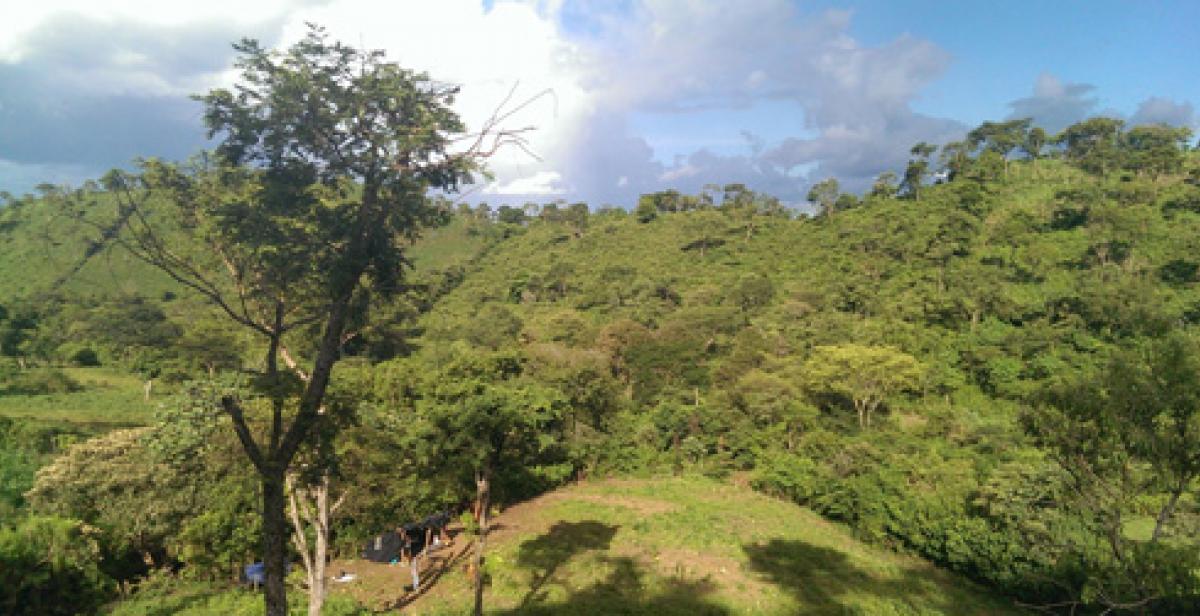On a three month volunteering placement in the smallest country in Central America - El Salvador, I stayed in a messy, green village called Santa Marta in the rural north. There on a lazy Saturday morning on placement I wrote on my thoughts, my surroundings, on the birds and banana plants and on lives here - specifically the lives of the youth I was working with. The programme we were involved with (Progressio ICS) sends groups of British volunteers to work alongside national volunteers of the same age, on issues of sustainable development put forward by the community. This blog is written in-country and touches on the reality of the lives of young Salvadorans.
23/08/2014: 08.11am
I'm lying in a hammock and feeling a cool breeze stroke my cheek. I've tricked my good iPod into thinking it has battery so am listening to The Boxer Rebellion's ‘Diamonds’. I woke up to an argument in Spanish happening outside my window, right next to my head, but now all seems calm. You may think it'd be the night that was peaceful but the night has been claimed by the animals around here, so apart from the odd bit of human activity - it's morning that’s quiet. The leaves of the banana plants in the distance are leaning lazily away from their trunk. Some of them are still dewy, which I find miraculous since the sun has been up since at least 6am. An almost optimistic feat, yet it’s there winking at me.
El Salvador doesn’t seem to have pesky pigeons or other annoying flying things. They do however have birds I only ever see in the sky - with a huge wing span, fingered feathers at the end and a fanned tail. They have birds the size of a hand with a delicate ambiguous shape, two-toned - you can barely see their head it's so faded. They seem to hang out in pairs. And as my eyes have just reminded me - there are chickens here too. They don't fly like pigeons but I’d class them as pesky none-the-less. I didn't realise how odd chickens were until I came here. They also seem to find themselves in trees a lot which baffles me- pretending to be the same as the rest of their feathered family. Then there’s the national bird of El Salvador, the Torogos, which I saw for real once, sitting on a telephone cable as I drove past countryside - the dark flashes of colour in its coat unmistakable with its elegant tear drop tail, almost invisible except for the dash of black at the end.
I often feel surprisingly content here, though in a different way to what I've experienced before. Content means something different. It's not this noisy individualistic society, with everyone scrambling for a place and a voice to be heard in the world - like the trees of a jungle with people climbing and grasping to get to the top and see that crack of sunlight.
Here, content is a hammock. Content is getting to the end of a hard sticky day's work but still having the energy to see your friends at the end. It's watching a bunch of leaves teasing each other with light in their own stark shadows.
At first when I came here, I thought about how boring life must be for some- lying in a hammock and watching life's slow trudge onwards. Seeing the same faces and hearing the same news. But I suppose life doesn't have to go at the same pace as a 20 year old trying to discover something wants it to. I see it as whizzing by and yet when I look down, I see the same browning legs as I had two years ago- maybe with a few more bites and scars from bamboo and grass, but still there. Maybe time doesn't go as fast as I think it does and it doesn't have to. Content is knowing your family are well looked after even if you can't be the one to do it. It's having enough water to live in a clean house with a clean body. It's a really good tortilla.
Yet when I'm writing this list of contentment’s I'm thinking of the older and wiser of the community - who often have a part in looking after me. What about the kids my age who aren't having an amazing cultural experience half away across the world from their home?
One of the national volunteers asked me what I thought about the fact that when we (the international volunteers) leave, the nationals don't have university or a job to go back to. Their lives continue after this summer with hopefully a few fond memories. Helping family out; hunting down work in an area with no jobs; turning down scholarships because your family can only afford for one child to go to university. That's what stays. And I had absolutely nothing in response of his question. What could I say?
And me? I'm a fairly content 20-year-old. For my friends here, contentment is a concept put on the back burner while their country continues to lose their youth to America, to gangs or to old age after a life of putting others first. If it can’t be found through a career or education, it has to come through that breeze and sunlight on your face whilst you swing in a hammock of your own.
Written by ICS volunteer Debbie Luxon



